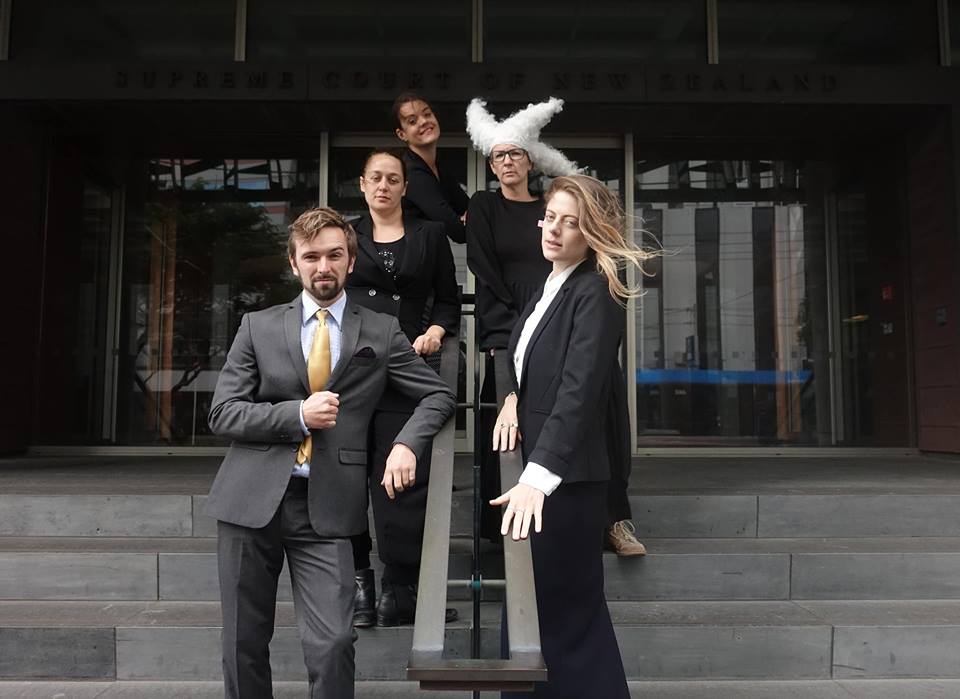Matt Loveranes
The jury itself consist of some familiar faces in the Wellington theatre community so it has a decidedly artistic-bent. With 6 men and 6 women, the selection achieves gender balance but not much diversity in terms of race or age range. This is not a huge problem as it reflects the general theatre-going audiences, but failing to even comment on this makes for a missed opportunity especially considering the case tackles racism head on.
The other major plot point for the evening is the issue of the defendant’s name suppression. A bizarre turn of events wherein the esteemed Judge Jody Ranzerson (Jo Randerson) takes a submission from journalist Jacqui Strongarm (Anya Tate-Manning) eventually leads to the latter leading the audience to an impromptu rendition of the national anthem. It is this commitment to absurdity that really gives the show its spark and gives it dramatic momentum but just as we build to something promising, it is revealed the issue of name suppression will be decided on overnight.
Thankfully, the second night offers something more substantive. In “It’s Plaintiff to See”, name suppression is upheld (anticlimactically, I may add) and we move forward with the plaintiff calling its witnesses. First up is Ria Simmons playing Mia Simons, a TVNZ media representative. She shifts the blame away from her network and onto the Canadian political scientists who were employed to take on the survey. The highlight of her testimony is breaking down on the stand upon facing tough cross-examination but the fact that this is so obviously performed takes away some of this section’s effectiveness.
What really compels is the testimony of David Farrar, noted National Party supporter, Kiwiblog operator and market researcher. Farrar is an eloquent speaker and in response to the statement “Maori should not receive special treatment”, argues that survey questions are merely used to track how many people follow certain beliefs and is not, in and of itself, racist. Up to the task is Miss Rizmackon, Counsel for the Defendant (Karin McCracken) who emphatically rebuts the validity of these questions by pointing out the systemic disadvantage of Maori and pulling apart the inherent flaws of the survey. One particularly excellent point centers around the possibility that those answering racially-tinged questions with prejudice still getting labelled as “patriots” upon completion of the survey. Conversely, those who answered in favour of Maori culture and privilege while negating questions based on bloke-based notions of national identity are labelled as “globalists” thus purporting a narrow-minded belief of whatever being a New Zealander really means. This may be a simplistic recollection of events, but the conflicting and well-argued beliefs from both sides brought about much needed dramatic potency to the production.
While the first night plays almost like an extended exercise in improv, the actors settle into their roles much more comfortably by the second night, maintaining a loose energy and fiercely committing to their characters despite the varying hit rates of their jokes. Maria Williams, whose confident and snarky Courtney T. Aker, succeeds in making acute observations which constantly keep the mood light while Randerson, who brings a natural gravitas to the role of esteemed judge, proves an astute facilitator with her unbothered, no-shits-given shtick. Her chemistry with Williams, apparent as they trade witty gibes, is a show highlight. Tate-Manning and Baxendale play more obviously comical characters, but I wonder whether their characters’ general incompetence blunts the bite of their satire. The real star is McCracken, who finds her character’s footing on the second night, relishing her role as uber-competent attorney.
As part of the media pit for the show, I will be present for at least one more night of the show’s run and will definitely be in attendance for its conclusion. I will write a more comprehensive assessment on the show then but for now I eagerly anticipate how the drama unravels. My hope is the microscope placed upon our judicial system is given a sharper gaze and that the notions of whatever “New Zealand” identity is, is more incisively explored. I’m ready to for what comes next. It’s just beginning to get good.
A Trial is devised by Joel Baxendale, Karin McCracken, Anya Tate-Manning, Jo Randerson and Maria Williams and runs till Saturday, 23 April, 7.30 PM at BATS theatre.






